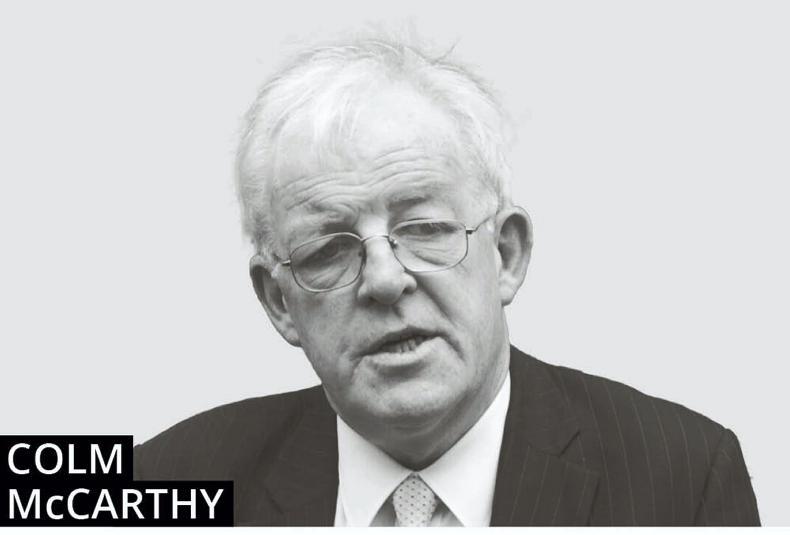Three national elections due over the next year will have consequences for the conduct of economic policy in Ireland. The first is our own general election, due no later than March 2025 but which political commentators expect towards the end of 2024.
The UK’s general election could be as late as January 2025 but will also likely be a little earlier while the US presidential election has a firm date for 5 November next year.
The election battleground in Ireland has already been staked out. The government parties have been loosening budget policy in the belief that the public finance constraint can safely be ignored, essentially because they hope the boom in tax revenues will continue.
Tax burdens were reduced in the October budget, current spending ceilings have been relaxed, the provision for health spending both this year and next is admitted to be inadequate and there are ambitious plans for capital spending.
The Irish Fiscal Advisory Council, the Central Bank and various economic commentators have expressed concern that the Government’s strategy is risky while the opposition parties argue for extra spending.
Whatever the composition of the next Irish Government, there is a sizeable overhang of sovereign debt and its five-year term of office will include a period of budget cutbacks unless Ireland’s luck with corporation tax holds out. This risk has not been properly acknowledged as the parties prepare for the polls.
Autumn statement
The UK chancellor in his autumn statement yesterday faced a greater dilemma.
The UK state’s balance sheet is precarious but without the bonus of unexpected corporate tax revenues. With an election looming the chosen course is to aspire to prudence, offer some tax reliefs and hope for the best.
The next government, likely to be a Labour administration under Sir Keir Starmer, will have to tighten budget policy. Economic prospects in the UK have weakened, in part due to the costs of Brexit, some of which have yet to hit home.
A poor economic outlook in Britain is never good news for Ireland and a period of sterling weakness would make things worse for exporters and would fuel imported inflation.
Recent opinion polls suggest that Donald Trump will secure the Republican nomination and could win a second term next November. His campaign website is called Agenda 47 (the next president will be the 47th) and reveals very specific plans for the pharmaceutical industry here, almost all of which consists of US companies.
It reports that Trump has “… announced his plan to end Joe Biden’s pharmaceutical shortages and return the manufacture of life-saving drugs to the United States.
“This is not just a public health crisis, it’s a national security crisis,” Trump said.
“As part of my plan to obtain total independence from China, we will phase in tariffs and import restrictions to bring back production of all essential medicines to the United States of America where they belong.
I signed an executive order to begin this process in 2020 but Biden has shamefully failed to follow through. This is a matter of tremendous urgency. American lives are on the line, and it will be one of my top priorities as president.
It will also create countless new American jobs.”
Along with the jobs will go the tax revenue bonanza, and Trump’s Democratic opponent will be under pressure to respond.
The US Congress is free to eliminate most of the Irish tax bonanza at any time
The Democratic party has traditionally been even more protectionist than the Republicans and the loss of corporate tax revenue, which affects American tech, as well as pharma companies here, could re-emerge as an election issue.
The US Congress is free to eliminate most of the Irish tax bonanza at any time and there have been legislative proposals to do just that.
The threat to Ireland’s current holiday from budget balance is usually seen as coming from tax harmonisation in the EU but the shape of the 2024 election in the US may prove to be the more immediate concern.
There are unacknowledged dangers to the Irish budget outlook anyway, including huge overshoots on projects like the National Children’s Hospital with more in prospect and none of them provided for.
It is not clear that the figures pencilled in for 2024 and later years can actually be delivered, and the coming election campaign could degenerate into an auction of promises.
Capital projects
Capital projects are often the first to be sacrificed if the budget has to be adjusted in a hurry and promises about capital schemes, especially ones without credible costings, need to be treated with particular scepticism.
For any big proposal, it is always prudent to ask what is the level of projected cost at which the plan will be aborted. For revenue-raising schemes like extra taxes on those deemed to be well-off, it would be nice to see the details in small print.






 This is a subscriber-only article
This is a subscriber-only article










SHARING OPTIONS: